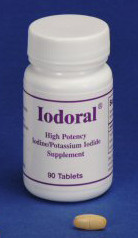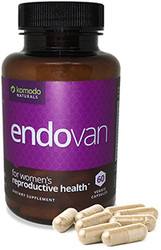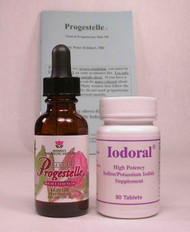Categories
Categories
- Home
- Female Estrogen Dominant Disease Conditions
- Iodoral - Iodine elemental, Iodine ionic, the body needs both type of iodine.
Iodoral - Iodine elemental, Iodine ionic, the body needs both type of iodine.
Product Description
- Iodoral is a Tablets form of Lugol Iodine solution, but does not cause stomach upset
- Iodine reduces sensitivity to xenoestrogens
- Jonathan Wright, MD of the Tahoma Clinic says that iodine helps convert "strong" estradiol to "weak" estriol
- Lugol Iodine is not very accurate, may stain clothing, has an unpleasant taste and causes gastric irritation.
- Iodoral® is a precisely quantified tablet form containing 5 mg iodine and 7.5 mg iodide as the potassium salt.
- To prevent gastric irritation, the iodine/iodide preparation was absorbed unto a colloidal silica excipient.
- To eliminate the unpleasant taste of iodine, the tablets were coated with a thin film of pharmaceutical glaze.
One 12.5 mg. tablet of Iodoral supplies an amount of total elemental iodine, comparable to the average daily intake of this essential element by mainland Japanese, a population with a very low prevalence of fibrocystic disease of the breast and breast cancer. Iodine is an essential element. Although its main function is in the production of thyroid hormones by the thyroid gland, other organs in the body have a need for iodine in order to function normally. Several studies have demonstrated a relationship between low iodine intake and fibrocystic disease of the breast (FDB), both in women and laboratory animals. The minimum amount of iodine required for control and prevention of FDB is equivalent to 0.1mg/kg body weight/day. For example, for a 50 kg woman, the daily amount of iodine would be 5 mg. The thyroid gland needs iodide to function properly. The original study done 80 years ago to control goiter in adolescent girls used 9 mg iodide daily. During the early 1900's, the iodine/iodide solution called Lugol solution was used extensively, effectively and safely in medical practice, for both low activity and above normal activity of the thyroid gland. The recommended daily intake for iodine supplementation was 2 to 6 drops of Lugol solution containing 12.5 to 37.5 mg total iodide. That amount was mentioned as lately as 1995 in a book on Pharmaceutical Sciences. Several investigators have shown convincing evidence connecting inadequate iodine intake and breast cancer. Japanese women living in Japan consumed a daily average of 13.8 mg total elemental iodine and they experience one of the lowest prevalence (risk) for breast, ovarian and uterine cancer. In the 1960's, one slice of bread in the USA contained the full RDA of 0.15 mg iodine. The risk for breast cancer was then 1 in 20. Over the last 2 decades, iodine was replaced by bromine in the bread making process. Bromine blocks thyroid function and may interfere with the anticancer effect of iodine.
 Loading... Please wait...
Loading... Please wait... 





